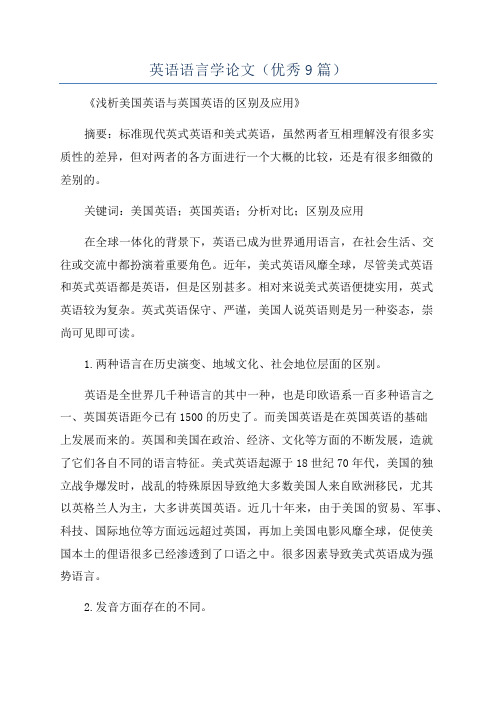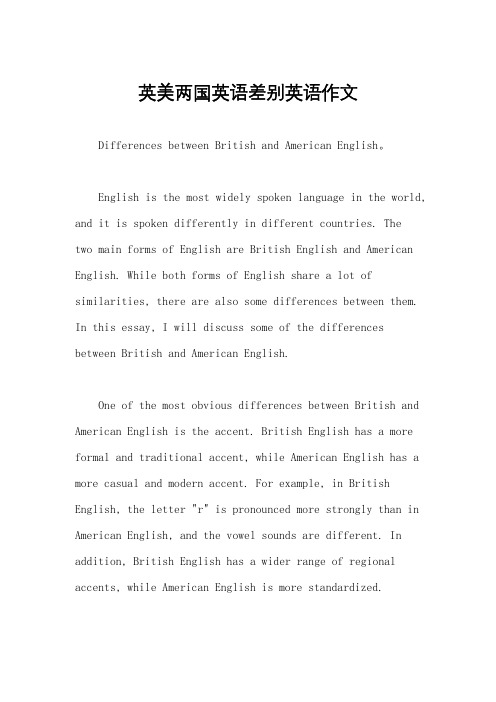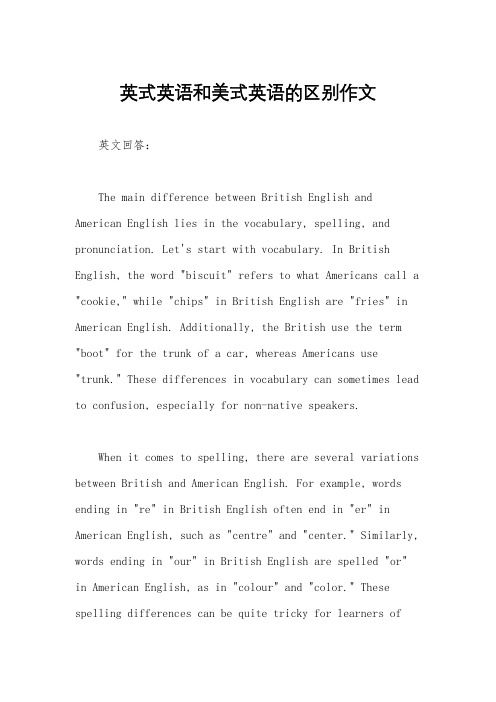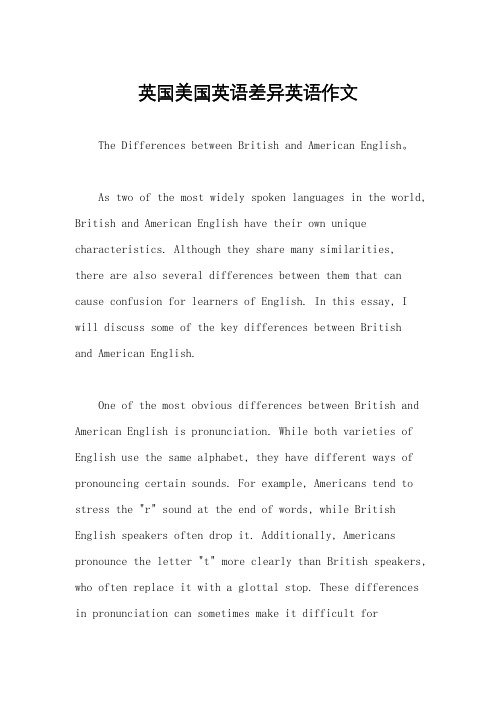美式英语与英式英语的差别论文
英语语言学论文(优秀9篇)

英语语言学论文(优秀9篇)《浅析美国英语与英国英语的区别及应用》摘要:标准现代英式英语和美式英语,虽然两者互相理解没有很多实质性的差异,但对两者的各方面进行一个大概的比较,还是有很多细微的差别的。
关键词:美国英语;英国英语;分析对比;区别及应用在全球一体化的背景下,英语已成为世界通用语言,在社会生活、交往或交流中都扮演着重要角色。
近年,美式英语风靡全球,尽管美式英语和英式英语都是英语,但是区别甚多。
相对来说美式英语便捷实用,英式英语较为复杂。
英式英语保守、严谨,美国人说英语则是另一种姿态,崇尚可见即可读。
1.两种语言在历史演变、地域文化、社会地位层面的区别。
英语是全世界几千种语言的其中一种,也是印欧语系一百多种语言之一、英国英语距今已有1500的历史了。
而美国英语是在英国英语的基础上发展而来的。
英国和美国在政治、经济、文化等方面的不断发展,造就了它们各自不同的语言特征。
美式英语起源于18世纪70年代,美国的独立战争爆发时,战乱的特殊原因导致绝大多数美国人来自欧洲移民,尤其以英格兰人为主,大多讲英国英语。
近几十年来,由于美国的贸易、军事、科技、国际地位等方面远远超过英国,再加上美国电影风靡全球,促使美国本土的俚语很多已经渗透到了口语之中。
很多因素导致美式英语成为强势语言。
2.发音方面存在的不同。
英语和美语的发音最具代表性的区别是对er的发音的不同。
英语中,短音的er是的浑元音,但长音的er是个拉长了的浑元音,听起来是一个介于“俄”和“啊”的声音。
而美语中,er听起来怎么都是个“儿”音。
ar:除了轻读短音(如singular)和者后连元音(如clarity),英语的ar全部清一色的长音[a:],而美语中,是“阿尔”。
英语和美语的辅音基本是一致的,但在使用习惯上也有些差别。
如词组clear animosity,英语会读成clear,animosity,而美语会读成clear—ranimosity。
另一个比较明显的区别是d和t。
英式英语与美式英语沟通方面差异的英语作文

英式英语与美式英语沟通方面差异的英语作文1. 引言1.1 概述英式英语和美式英语是世界上最主要的两种英语变种,它们在口音、发音、词汇和文化等方面存在着差异。
这些差异常常会对使用者之间的沟通产生一定程度的影响。
本文将探讨英式英语与美式英语在沟通方面的差异,并分析这些差异可能产生的影响。
1.2 文章结构本文分为五个部分进行论述。
首先,在第二部分中,我们将概述英式英语和美式英语各自的特点,并比较二者之间的区别与联系。
接下来,在第三部分中,我们将深入探讨其在口音、发音以及重音和语调方面的差异。
然后,在第四部分中,我们将重点研究两种变种之间词汇和拼写上的不同之处,并探讨这些差异对沟通所带来的影响。
最后,在第五部分中,我们将讨论文化背景对于沟通方式以及隐含意义理解上所起到的作用,并提出评估个体文化适应能力的方法。
1.3 目的通过本篇文章,我们旨在增加读者对于英式英语和美式英语之间差异的认识,并使读者更好地理解在跨文化交流中可能面临的障碍。
同时,本文还将为使用者提供一些实用的技巧和建议,以便更加有效地进行英式英语和美式英语之间的沟通。
通过探讨这两种变种之间的差异,我们希望能够促进不同国家和地区使用者之间的相互理解和尊重,实现更加顺畅、有效的跨文化交流。
2. 英式英语与美式英语概述:2.1 英式英语特点:英式英语是指在英国使用的标准英语,也被广泛应用于其他英联邦国家。
它具有以下特点:- 发音:英式英语注重清晰而规范的发音,辅音的发音往往比较清晰,如“r”音不发或轻声发出。
- 词汇:英式英语在词汇选择上更偏向传统和保守,使用一些更古老、复杂的词汇,如“lift”(电梯)。
- 拼写:相对于美式英语,一些单词的拼写可能存在差异,如“colour”(颜色)和“centre”(中心)。
- 语法:英式英语通常对应用法要求比较严谨,例如使用时态及代词时会更加讲究准确。
2.2 美式英语特点:美式英语是在美国使用的标准化形式,并广泛流行于加拿大和其他地区。
英美两国英语差别英语作文

英美两国英语差别英语作文Differences between British and American English。
English is the most widely spoken language in the world, and it is spoken differently in different countries. Thetwo main forms of English are British English and American English. While both forms of English share a lot of similarities, there are also some differences between them. In this essay, I will discuss some of the differences between British and American English.One of the most obvious differences between British and American English is the accent. British English has a more formal and traditional accent, while American English has a more casual and modern accent. For example, in British English, the letter "r" is pronounced more strongly than in American English, and the vowel sounds are different. In addition, British English has a wider range of regional accents, while American English is more standardized.Another difference between British and American English is the spelling. There are many words that are spelled differently in the two forms of English. For example, in British English, the word "colour" is spelled with a "u", while in American English, it is spelled "color". Similarly, in British English, the word "centre" is spelled with an "re", while in American English, it is spelled "center". These spelling differences can cause confusion for people who are learning English, as they need to remember which spelling to use in different situations.Grammar is another area where British and American English differ. For example, in British English, collective nouns are often treated as plural, while in American English, they are treated as singular. So, in British English, you would say "The team are playing well", whilein American English, you would say "The team is playing well". Similarly, in British English, the past participleof "get" is "got", while in American English, it is "gotten".Vocabulary is also an area where British and AmericanEnglish differ. There are many words that are useddifferently in the two forms of English. For example, in British English, the word "biscuit" refers to a small,sweet cake, while in American English, it refers to a small, savory cake. Similarly, in British English, the word "boot" refers to the trunk of a car, while in American English, it refers to a type of footwear. These differences in vocabulary can cause confusion for people who are learning English, as they need to learn which words are used inwhich context.In conclusion, while British and American English share a lot of similarities, there are also some differences between them. These differences can cause confusion for people who are learning English, but they also add richness and diversity to the language. As English continues to evolve and change, it will be interesting to see how these differences continue to develop.。
英式英语和美式英语的区别作文

英式英语和美式英语的区别作文英文回答:The main difference between British English and American English lies in the vocabulary, spelling, and pronunciation. Let's start with vocabulary. In British English, the word "biscuit" refers to what Americans call a "cookie," while "chips" in British English are "fries" in American English. Additionally, the British use the term "boot" for the trunk of a car, whereas Americans use "trunk." These differences in vocabulary can sometimes lead to confusion, especially for non-native speakers.When it comes to spelling, there are several variations between British and American English. For example, words ending in "re" in British English often end in "er" in American English, such as "centre" and "center." Similarly, words ending in "our" in British English are spelled "or" in American English, as in "colour" and "color." These spelling differences can be quite tricky for learners ofEnglish, as they have to remember which version to use in different contexts.Pronunciation is another key difference between the two varieties of English. For instance, the British tend todrop the "r" sound at the end of words, while Americans pronounce it. This can be heard in words like "car" and "water." Additionally, the vowel sounds in certain wordsare also pronounced differently. For example, the word "schedule" is pronounced "shed-yool" in British English and "sked-yool" in American English.In terms of grammar, there are some differences as well. For instance, the use of the present perfect tense is more common in British English, while Americans often use the simple past tense in the same context. For example, aBritish person might say, "I have just eaten," whereas an American would say, "I just ate."Overall, these differences between British English and American English can sometimes lead to misunderstandings, but they also add richness and diversity to the Englishlanguage.中文回答:英式英语和美式英语的主要区别在于词汇、拼写和发音。
英式英语和美式英语的差异讲座作文

英式英语和美式英语的差异讲座作文Here is an essay on the differences between British English and American English, written in English and with over 1000 words. There are no additional titles or unnecessary punctuation marks in the body of the text.The Differences between British English and American EnglishEnglish is one of the most widely spoken languages in the world, with over 1.5 billion speakers globally. However, the English language is not a monolith – it has evolved and diversified over time, giving rise to distinct regional varieties. The two most prominent and influential forms of the English language are British English and American English. While they share a common linguistic heritage, these two varieties of English exhibit significant differences in vocabulary, spelling, pronunciation, and grammar.One of the most noticeable differences between British English and American English is in vocabulary. Many common words have different meanings or connotations in the two varieties. For example, the word "biscuit" in British English refers to what Americans would call a "cookie," while in American English, a "biscuit" is a type ofsavory quick bread. Similarly, the British use the term "lift" to refer to what Americans call an "elevator," and the American "sidewalk" is known as a "pavement" in Britain.Spelling differences also abound between the two varieties of English. While both adhere to the same general principles of orthography, there are consistent variations in the spelling of certain words. British English tends to favor spellings with the letter "u" in words like "colour," "flavour," and "humour," while American English often omits the "u" in these words, spelling them as "color," "flavor," and "humor." Additionally, British English typically uses the "-ise" ending in words like "realise" and "organise," while American English prefers the "-ize" ending, as in "realize" and "organize."Pronunciation is another area where British English and American English diverge. One of the most prominent differences is the treatment of the letter "r." In most varieties of British English, the "r" sound is only pronounced when it precedes a vowel, as in the word "car." In American English, however, the "r" sound is typically pronounced in all positions, including at the end of a word. This results in words like "idea" being pronounced with an "r" sound in American English, while British English speakers would pronounce it without the "r."Furthermore, the two varieties of English have developed distinctintonation patterns and rhythms. British English is often characterized by a more formal, clipped delivery, with a greater emphasis on precise enunciation. American English, on the other hand, is generally perceived as having a more relaxed, "sing-song" quality, with a tendency towards vowel reduction and a less formal tone.In terms of grammar, there are also notable differences between British English and American English. One example is the use of collective nouns. In British English, collective nouns like "team" or "government" are often treated as plural, with the verb agreeing in number (e.g., "The team are playing well"). In American English, these collective nouns are more commonly treated as singular, with the verb agreeing accordingly (e.g., "The team is playing well").Another grammatical difference is the use of modal verbs. British English tends to use the modal verb "shall" more frequently than American English, particularly in formal contexts. American English, on the other hand, favors the use of "will" in these instances. Additionally, the use of the past perfect tense (e.g., "had done") is more common in British English than in American English, where the simple past tense (e.g., "did") is often preferred.These linguistic differences between British English and American English can be attributed to a variety of historical, cultural, and socialfactors. The divergence of the two varieties can be traced back to the colonial era, when the English language was transported to North America by British settlers. As the two regions developed distinct political, economic, and social identities, the English language evolved independently, resulting in the emergence of these distinct forms.Furthermore, the influence of other languages and cultures has also played a role in shaping the differences between British English and American English. For example, the prevalence of French loanwords in British English, such as "garage" and "hors d'oeuvre," reflects the historical ties between Britain and France. Conversely, the influx of Spanish and other immigrant languages in the United States has contributed to the unique vocabulary and idioms found in American English.Despite these differences, it is important to recognize that both British English and American English are valid and respected forms of the language. They are not superior or inferior to one another; they are simply different manifestations of a rich and dynamic linguistic heritage. Ultimately, the diversity of the English language is a testament to its adaptability and the creativity of its speakers.In conclusion, the differences between British English and American English are multifaceted and extend beyond the surface-levelvariations in vocabulary and spelling. These two varieties of English have developed distinct phonological, grammatical, and cultural characteristics, reflecting the unique histories and identities of their respective regions. While these differences can sometimes lead to confusion or misunderstandings, they also contribute to the richness and vibrancy of the English language as a whole.。
英国和美国的区别英语作文

英国和美国的区别英语作文Title: Contrasting English: British vs. American English。
English, being one of the most widely spoken languagesin the world, exhibits fascinating diversity across regions, with British and American English standing out prominently. Despite sharing a common linguistic origin, these two variants have evolved separately, resulting in several notable differences in vocabulary, pronunciation, spelling, and even grammar. In this essay, we will delve into the distinctions between British and American English, highlighting their unique characteristics.Firstly, one of the most apparent dissimilarities liesin vocabulary. British English tends to preserve olderwords and expressions, reflecting its rich history and cultural heritage. For instance, in British English, "lorry" is used to refer to a truck, "lift" for an elevator, and "flat" for an apartment. On the other hand, AmericanEnglish often adopts more straightforward terms, with "truck," "elevator," and "apartment" being commonly used. Additionally, there are instances where different words are employed to describe the same object or concept, such as "biscuit" in British English corresponding to "cookie" in American English, or "aubergine" versus "eggplant."Secondly, pronunciation discrepancies contribute to the distinctiveness of British and American English. While both variants share a core set of phonemes, their pronunciation can vary significantly. One notable contrast is the treatment of the "r" sound. In British English, the "r" is often not pronounced after vowels, leading to accents like Received Pronunciation (RP). In contrast, American English generally pronounces the "r" sound, exemplified in accents such as General American (GA). Furthermore, differences in vowel sounds, intonation patterns, and stress placement further distinguish the two varieties.Moving on to spelling, British and American English exhibit disparities that can sometimes lead to confusion. Perhaps the most well-known distinction is the presence ofthe letter "u" in certain words in British English, such as "colour," "favour," and "honour," whereas these words are spelled without the "u" in American English as "color," "favor," and "honor" respectively. Additionally, variations in the use of double consonants, such as "travelling" (British) versus "traveling" (American), contribute to the spelling distinctions between the two forms.Moreover, grammatical variances exist between British and American English, although they are generally less conspicuous than lexical and phonological differences. One example is the use of present perfect tense. British English tends to use present perfect more frequently than American English, especially in contexts where past actions have relevance to the present moment. For instance, "I have just finished my work" is more common in British English, whereas Americans might prefer "I just finished my work."In conclusion, while British and American English share a common linguistic ancestry, they have diverged over time, resulting in notable differences in vocabulary, pronunciation, spelling, and grammar. These distinctionscontribute to the rich tapestry of English language variations, reflecting the cultural and historical contexts in which they developed. Despite these disparities, both variants remain integral components of the globallinguistic landscape, each with its own charm and significance.。
英式英语论文:英式英语与美式英语的区别

英式英语论文:英式英语与美式英语的区别【摘要】美式英语脱胎于英式英语,既是英式英语的继承,也受到新大陆环境的雕琢。
虽然二者之间的差别不是很大,也未使这两类英语的学习者之间达到不了解的程度,但这使英语知识不太丰富的学习者经常感到困惑,给他们的阅读理解、听力、语言交流、写作等方面带来了很大的障碍。
【关键词】英式英语美式英语区别美式英语既是英式英语的继承,也受到新大陆环境的雕琢。
笔者试从语音、词汇、拼写、语法、习惯用法和商务英语书信差异等方面分析英式英语和美式英语的区别。
一、语音方面美式英语和英式英语的发音区别主要体现在以下几个方面:1、美式英语元音鼻化,英式英语中元音都不鼻化。
2、美式英语中重读元音比英式英语中读得长些。
如:been[bi:n](美)/[bin](英),again[gein](美)/[gen](英)。
3、在标准英语中,字母r在元音之前才发音,在美国英语中r不管在词中什么位置都发音,而且还对其前面元音的发音产生影响。
像car,turn,learn,offer等词发音,两种英语的发音听起来就不同。
4、在美式英语中,元音之间的t和d都读成轻浊辅音[d]。
因此,writer读成[raider]和rider[eraidar]听起来一样。
在英式英语中,元音之间的t仍是清辅音,write读成[rait],rider[raid]。
5.在-u和-ew之前,英国人把n-,d-,t-读成[nj-,dj-,tj];而美国人则根据拼写来读音。
如:tune[tju:n],new[nju:](英)/[tu:n],[nu:](美)。
6、在英式英语中,-tile结尾的词读成[-tail],而在美式英语中则读成[-til]。
例如:fortile[f:tail](英)/[f:til](美)。
7、borough和thorough两个词在美式英语和英式英语中的发音也不相同,英国人读成[bλr]和[λr],而美国人则读成[bλrau]和[λr]。
英国美国英语差异英语作文

英国美国英语差异英语作文The Differences between British and American English。
As two of the most widely spoken languages in the world, British and American English have their own unique characteristics. Although they share many similarities,there are also several differences between them that can cause confusion for learners of English. In this essay, Iwill discuss some of the key differences between Britishand American English.One of the most obvious differences between British and American English is pronunciation. While both varieties of English use the same alphabet, they have different ways of pronouncing certain sounds. For example, Americans tend to stress the "r" sound at the end of words, while British English speakers often drop it. Additionally, Americans pronounce the letter "t" more clearly than British speakers, who often replace it with a glottal stop. These differences in pronunciation can sometimes make it difficult forspeakers of one variety to understand the other.Another difference between British and American English is vocabulary. Although the two varieties share many words, there are also several words that are used differently or have different meanings. For example, in British English, a "biscuit" is a type of cookie, while in American English, a "biscuit" is a type of bread roll. Similarly, in British English, "chips" are what Americans would call "French fries," while in American English, "chips" are thin slices of potato that are fried and served as a snack. These differences in vocabulary can sometimes lead to confusion or misunderstandings between speakers of the two varieties.Grammar is another area where British and American English differ. While the basic rules of grammar are the same, there are some differences in usage. For example, in British English, collective nouns (such as "team" or "family") are often treated as singular, while in American English, they are usually treated as plural. Additionally, in British English, the past participle of the verb "get"is "got," while in American English, it is "gotten." Thesedifferences in grammar can sometimes make it difficult for learners of English to know which rules to follow.Finally, there are also differences in spelling between British and American English. While many words are spelled the same way in both varieties, there are several wordsthat are spelled differently. For example, in British English, the word "colour" is spelled with a "u," while in American English, it is spelled "color." Similarly, in British English, the word "centre" is spelled with an "re," while in American English, it is spelled "center." These differences in spelling can sometimes cause confusion or make it difficult for learners of English to know which spelling to use.In conclusion, although British and American English share many similarities, there are also several differences between them. These differences can cause confusion or misunderstandings for learners of English, but they are also what make the two varieties of English unique. By understanding these differences, learners of English canbecome more proficient in both varieties and better able to communicate with speakers from both sides of the Atlantic.。
- 1、下载文档前请自行甄别文档内容的完整性,平台不提供额外的编辑、内容补充、找答案等附加服务。
- 2、"仅部分预览"的文档,不可在线预览部分如存在完整性等问题,可反馈申请退款(可完整预览的文档不适用该条件!)。
- 3、如文档侵犯您的权益,请联系客服反馈,我们会尽快为您处理(人工客服工作时间:9:00-18:30)。
美式英语与英式英语的差别论文
为了更加了解美式英语与英式英语的差异,有二点理由说明了我们为什么要强调使用英语的人数以及英语的世界性。
首先,英语并不是美国人或英国人,或其以英语为母语者的唯一特产。
另外说英语的人俞多,它的地理位置分布愈广大。
在一般人的观念里英国是一个很严谨的国家。
英国人似乎在穿着上,用餐的礼仪上,工作的时候都很严谨,也较有规律。
也因此,大众对英国的语言也有相同的观念,觉得英式英语是一种严谨的语言。
而美国是由英国移民所组成的一个国家,它的建国时间较短,因此,在人们的印象中,美国和英国有着大大的不同。
美国人较热情,做任何事情随心所欲,所以美国人在说话时也应是如此。
在美国的英语中,有许多很口语化的方言和俗语,就像我们台湾本土的闽南语一样有很多很有趣的俗语,也许会人认为在英语的对话中添加一些方言和俗语,会让人觉得粗俗或没水准。
其实不然。
因为若在说话时添加一些方言或俗语,可以使你说出来的话更生动活泼、更丰富、更有内涵,且更容易让人了解。
相对的,如果说话时都一板一眼、毫不越矩,不但自己说话时要很小心谨慎,别人也无法很轻松地与你交谈。
英国人和美国人所使用的英语都遵循既定的规则,但随着社会潮流的进步及改变,无论是在英国或是美国,人们所使用的英语也都一直在改变。
只是在大众的感觉里,美国英语改变的速度似乎比英国英语还要来的快。
但事实上,学者们的研究却认为美式英语在某些层面上比英式英语还要守旧。
此外,学者们也认为造成两者差异最大的原因是因为自然环境的不同。
例如:区域、地形、动植物和人口稠密度。
另外,还有些原因是因为英国人和美国人生活背景和社会体制的不同。
例如:政治体制、教育体制。
美国的语言也叫做「英语」,乍听之下好像不合常理,因为应该是英国的语言才叫做「英语」,但是由于美国人是来自于英国的移民,所以美国人和英国人所说的语言都是同一种语言。
虽然这两个国家所说的都是一种语言,但是还是有些许的差异,不过这些差异对一般人来说也许明显,但却不尽然明了其差异之根源所在。
在1700年以前,英语并没有英式英语和美式英语两种分别,因为当时只有英国,美式英语在当时是不存在的。
不过之后,因为部分英国人移民到美洲大陆,在美洲大陆又发展了一个文化,再加上英语这个语言在口说及书写方面很少受要标准化和统一化的影响,因此,今日英语才形成英式英语及美式英语两种形式。
而由此我们也可以知道,英式英语及美式英语两者之间最大的差异是在「发音」和「字母」。
一种语言使用的人越多,范围越广,就越容易产生差异,变成了虽然是同一种语言,但却有不同的体系,不同的形式出现。
其实,并不是只有英国和美国这两个国家所使用的英语有所差异,所有英语系的国家所使用的英语多多少少都有些不同,不过虽然各个国家所使用的英语都各有其特点,但唯有英国英语和美国英语较为一般人所知道,较具借债性,因此我们就以这两种较具代表性,也较有系统性的英语来作研究与探讨。
本文研究将英式英语与美式英语两者之间的差异,大致分为发音、字母、文化等三个章节,以此三种较主要的特点来深入探讨两者之间的差异。
此外本研究也将以英国及美国现在的文化、社会现象为背景,来深入去分析两者之间的差异,以其增加读者对两者的认识。
发音方面:全世界各地的英语腔调都不尽相同,如果你在宴会上同时碰到一位美国人与一位英国人,几分钟之内就可以凭着他们的对话辨认出来。
最明显的线索当然就是发音,例如dance、butter、no、bird等等,不仅子音、元音的咬字有差异,就连重音位置也常常不一样。
不过这不是严重的问题,一般只要花点时间,大概也就能轻易地习惯各地的腔调。
想想看,即使是在同一个国家,同一种语言都还是可能会不同的发音与腔调,像是美国东部与南部的人所讲的英语听起来就有很大的不同,所以更何况是来自不同国家的人呢?英式英语和美式英语有其显注不同之处,以发音方面来看,以卷舌音为例,无论是英式英语还是美式英语,
当出现在母音之前时,讲话者都会发出sound,但是如果出现在一个母音后面时,英国人一般就不发sound了,但是讲美式英语的人就会发很清楚的卷舌音。
拼音方面:英式英语的拼法和美式英语的拼法略有些差异,例如:centre center 中心colour color 颜色labour labor 劳工organise organize 组织realise realize 发现theatre theater 剧院
片语/用字方面:英式英语美式英语中文autumn fall 秋天bangers and mash sausage and potato 香肠和马铃薯biscuit cooke 饼干birollie umbrella 雨伞car automobile 汽车care-taker anitor 管理员car park parking lot 停车场chips French fries 薯条crisps potato chips 洋芋片flat apartment 公寓fullstoo period 句点jumper sweater 运动衣lift elevator 电梯lorry truck 卡车;大货车motorway freeway 高速公路on your todd on you own 你自己的方式pavement sidewalk 行人道petrol gasoline 汽油rubber eraser 橡皮擦shop store 商店sweets candy 糖果tap faucet 水龙头trainers sneakers 运动鞋trousers pants 长裤tube subway 地铁wellingtons rubber boots 长筒靴zebra crossing pedestrian crossing 行人穿越道试着去习惯英式英语与美式英语的不同用法与腔调,我们还会了解更多。
在听力方面,我们一定要注意听清楚重音在哪,连读的部分是怎样连贯的。
现在的考生在中学阶段主要学的是标准英式发音,大学阶段又更多地接触了美式发音。
美式发音和英式发音的区别虽然很不明确,但还是有一些规律可循的,例如:英式读法中r不发音(如arm、poor等),美式读法却要发音。
解决这个问题除需要系统了解外,主要靠平时多听多说,养成耳朵的适应性。
需要注意的是,英式英语和美式英语之间在用词上也有区别。
例如:“秋天”,英式英语常用autumn,美式英语则多使用fall。
有三个英语形态可能改变的地方:腔调全世界英语腔调都有不同的说法,而且有可能只有很少数几种语言没有不同的腔调,在国境之内或超越国境之外.纽约人不仅和伦敦人腔调不同,甚至和德州他的也不一样.试着去熟悉一个新的腔调只需很短的时间,而且可能很有趣。
字汇:在这方面有些字汇是不同的,但一个英国人和美国人之间可以互相快乐的交谈上好几个小时,没有任何一个字会被不了解。
比较常见的词汇如下:petrol and gasoline 汽油tap and faucet 水龙头car and automobile 汽车lift and elevator 电梯care-taker and janitor 管理员car park and parking lot 停车场pavementandsidewalk 行人道trousers and pants 长裤dustbin/waste paper basket and trash/garbage can 垃圾桶flat and apartment 公寓motorway and freeway 高速公路lorry and truck 大货车autumn and fall 秋天rubber and eraser 橡皮擦sweets and candy 糖果shop and store 商店biscuit and cookie 饼干fullstop and period 句点在语法上,两者也有区别:
英国人有时喜欢在美国人不用冠词时使用。
例如:英式英语:It was a Tuesday and he wasn't back at work until the Wednesday. 反过来,美国人用冠词时英国人不用。
例如英式英语:I had been out of hospitable for six weeks. 另外,介词用法也不同。
例如:英式英语:at the weekend 美式英语:on the weekend 英式英语:Some parents are talking about keeping their children off school. 美式英语:Some parents are talking about keeping their children out of school.
我们接下来看看世上对这两种英语分布情况:英式英语和美式英语哪一种使用得更多?从目前世界上使用英语的人数来看,使用英式英语的人数约是10亿人,使用美式英语的人数约2亿5000万人。
使用英式英语的国家有:英国,爱尔兰,加拿大,澳大利亚,纽西兰,印度,巴基斯坦,香港,新加坡,南亚共和国等。
学习英式英语的国家有:葡萄牙,法国,德国,荷兰,西班牙,比利时,意大利,澳大利亚,瑞士,挪威,瑞典,芬兰,希腊等全欧州及全非州地区,日本(60%),中国(香港影响)马来西亚,印度尼西亚等大部份亚洲国家,70%南美州国家等。
使用美式英语的国家有:美国,非律宾。
学习美式英语的国家有:中国(20%),日本(30%), 韩国, 南美洲33%等。
由此可以看出美式与英式英语的区别不大却也有差异。
热门网658S13sOw4w5。
